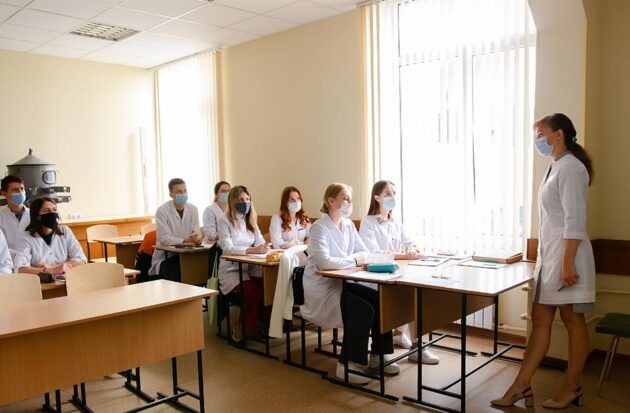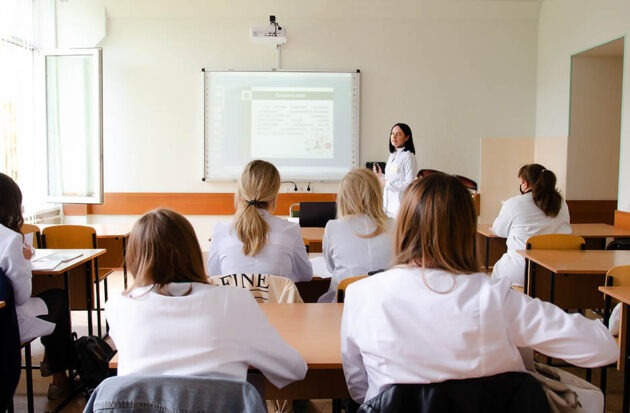The department provides training for students under educational-professional programs:
The first (bachelor’s) level in the specialties:
- 227 “Physical Therapy”
- 231 “Social Work in Public Health”
- 224 “Medical Diagnostics and Treatment Technologies”
- 223 “Nursing”
- 053 “Psychology”
The second (master’s) level in the specialties:
- 222 “Medicine”
- 221 “Dentistry”
- 228 “Pediatrics”
- 224 “Medical Diagnostics and Treatment Technologies”
- 223 “Nursing”
- 227 “Physical Therapy”
- 281 “Public Administration”
- 229 “Public Health”
- 011 “Educational and Pedagogical Sciences”
- 053 “Psychology”
The third (educational-scientific) level (PhD) in the specialties:
- 222 “Medicine”
- 228 “Pediatrics”
- 221 “Dentistry”
- 224 “Medical Diagnostics and Treatment Technologies”
Mandatory educational components (disciplines) are studied at the department: “Hygiene and Ecology,” “Hygiene and Ecology with Hygiene of Childhood and Adolescence,” “Safety of Life; Fundamentals of Bioethics and Biosafety; Occupational Safety in the Field,” “Occupational Safety in the Field of Medicine,” “Human Ecology, Toxicology, Physiology, and Biochemistry of Environmental Stress Factors,” “Social and Environmental Safety of Activities,” “Intellectual Property, Copyright, Academic Integrity,” “Fundamentals of Occupational Safety and Life Safety.”
When training students, modern interactive teaching methods are widely used including the use of case studies, control blocks with gamification elements, Moodle platform resources with thematic video files, YouTube video hosting, specialized video resources, lectures and training from the American Academy of Environmental Medicine, United States Environmental Protection Agency, Centers for Disease Control and Prevention for visual perception of educational information, educational and control modules – Kahoot learning, etc. These teaching methods contribute to the formation of skills and competencies in students to ensure the effective assimilation of methodological aspects for sanitary-hygienic supervision of national economy objects, approaches to occupational health management in the field of medicine, creation of safe, harmless, and proper working conditions and occupational safety in accordance with current legislative and other normative-legal acts, formation of principles of rational nutrition, and mechanisms of the influence of nutrition on public health.
The department offers elective courses: “Occupational Hygiene,” “Fundamentals of Occupational Safety,” ” Fundamentals of Occupational Safety and Life Safety,” “Life Safety,” “Occupational Safety in Medicine,” “Occupational Safety in the Field of Medicine,” “Occupational Psychology,” “Medicine of Extreme Conditions and Prevention of Non-Epidemic Diseases,” “Psychohygiene: Pre-Diagnosis and Prevention of Mental Disorders,” “Ecology,” “Hygiene of Settlements,” “Clinical Environmental Medicine,” ” Fundamentals of Ecology,” “Formation of a Healthy Lifestyle,” ” Fundamentals of Ecology and Preventive Medicine,” “Nutrition Science,” “Nutritional Support in Rehabilitation,” “Dietetics and Diet Therapy,” “Fundamentals of Healthy Nutrition and Dietetics,” “Regulatory Requirements for the Placement and Operation of Prosthetics and Orthotics Production,” “Organization of Nursing in the Field of Military Hygiene,” “Basics of Patent Science,” “Management of Medical-Social and Environmental Safety,” “Intellectual Property and Academic Integrity,” “Management and Presentation of Scientific and Educational Projects.” In 2021, an interactive scientific-publicist collection (electronic resource) “Human Ecology. Essays on the Present” was introduced into the educational process at the department.


